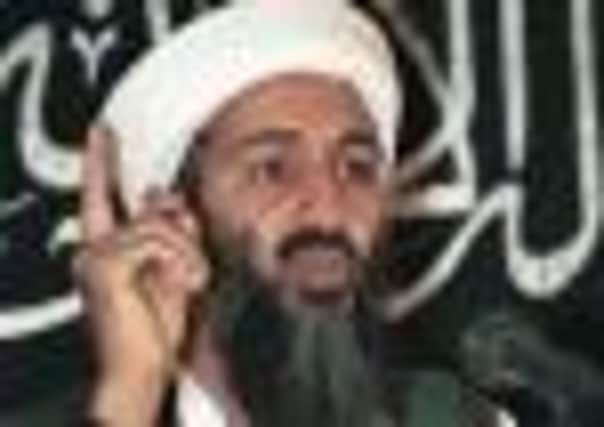Patrick Mercer: The icon of terror is eliminated, but we must beware of wounded al-Qaida


First, let’s be glad, though. A monster who has killed many thousands of people has been destroyed and the loss of this iconic figure will be a blow to Islamist extremists, no matter to what faction of al-Qaida or its affiliates they owe their loyalty.
Next, it is worth remembering that al-Qaida’s philosophy sprang, more than 30 years ago, from opposition to Hosni Mubarak and Egypt – the “near enemy” as they would style it.
Advertisement
Hide AdAdvertisement
Hide AdNow, that Mubarak’s regime has been toppled with no direct involvement from al-Qaida, and with none of their twisted logic to replace it, their cause is looking pretty tattered. And, of course, for those who are involved in the fight against these terrorists, the death of its leader is a tremendous fillip.


But, just how significant was bin Laden?
He’s always been the President rather than the CEO – remember the stories of how delighted but surprised he was said to be at the success of the Twin Towers attacks on 9/11.
If you look at the Islamist websites, while his name is often mentioned, it’s more as a polite nod than a matter of day-to-day tactics. And why has his face disappeared from t-shirts?
At one time no self-respecting malcontent would have been without one. Yet where are they now?
Advertisement
Hide AdAdvertisement
Hide AdThen, it’s more than three years since we’ve had a real-time broadcast from the man. Yet the fight continues without, apparently, any direct involvement from him. On top of this, as I’ve argued in this paper before, the crux of the so called “war on terror”, despite being initiated from and continued today by our forces in Afghanistan, lies in Pakistan.
One of al-Qaida’s core aims is to foment war between nuclear-tipped India and Pakistan, and it is the latter country where the first effects of bin Laden’s death are most likely to be felt.
Despite the uneasy alliance between Pakistan and the Western Allies, it has to be asked why it was possible for him to have a specially-designed villa built for him to live in just 35 miles from Islamabad and in the suburbs of a military town. Wasn’t he supposed to be scurrying from cave to cave in impenetrable mountains harried by satellites and drones?
Apparently not; he’s been living in luxury and (until yesterday) safety – yet without the Pakistani authorities knowing.
Advertisement
Hide AdAdvertisement
Hide AdNo, the one thing that’s certain about this is that there will be a wave of trouble in Pakistan and further ructions for President Asif Ali Zardari.
The UK’s news seldom makes much of it, but al-Qaida mounts daily attacks in Pakistan that kill scores – this will only be intensified as Osama’s people try to claw back some credibility. And what will the effects be at home?
No reader of this paper can forget that some of the most serious terrorist plots in Britain to date have been hatched and nurtured in Yorkshire, nor that radicals are constantly trying to suborn our considerable Islamic population. Now, more than ever, Pakistan’s problems are likely to be reflected upon our soil.
It’s not as if our enemies haven’t been preparing themselves for this coup. A few weeks ago, I was investigating al-Qaida’s claims that they had access to nuclear weapons. There’s no doubt that they would like to have such things although I believe a “dirty bomb” – while remote – is more likely than a standard munition, but what did surprise me was their websites’ boast about when they would be used.
Advertisement
Hide AdAdvertisement
Hide AdThe death of “The Sheikh” – as bin Laden was known – would prompt such attacks against “centres of western decadance”, they shrieked. Now, while it was almost possible to see the rabid foam at the other end of the terminal, such a calamity has obviously been carefully thought through by our enemies.
Then, there is the intense uncertainty around the Arab world. No-one knows what Egypt, Libya and Syria will look like in the future while things in “stable” Saudi Arabia – bin Laden’s birthplace – are febrile.
And let’s remember that the Christmas Day airline bomb of 2009, and the ink-cartridge devices at East Midlands Airport last October, came from a powerful new kid on the block – al-Qaida in the Arabian Peninsula, and based in Yemen.
Osama bin Laden’s death, I suggest, will do nothing other than stimulate such organisations to struggle for supremacy within their own hierarchy.
Advertisement
Hide AdAdvertisement
Hide AdI can understand America’s delight at the success of their troops yesterday, but there’s a note of triumph and political advantage in President Barack Obama’s words that I find distasteful. This attack hasn’t cut the head off the al-Qaida snake – it has merely wounded it. And animals, of course, are at their most dangerous when they are wounded creatures.
Patrick Mercer is the Conservative MP for Newark. He is a former soldier who also advised Gordon Brown’s government on counter-terrorism.